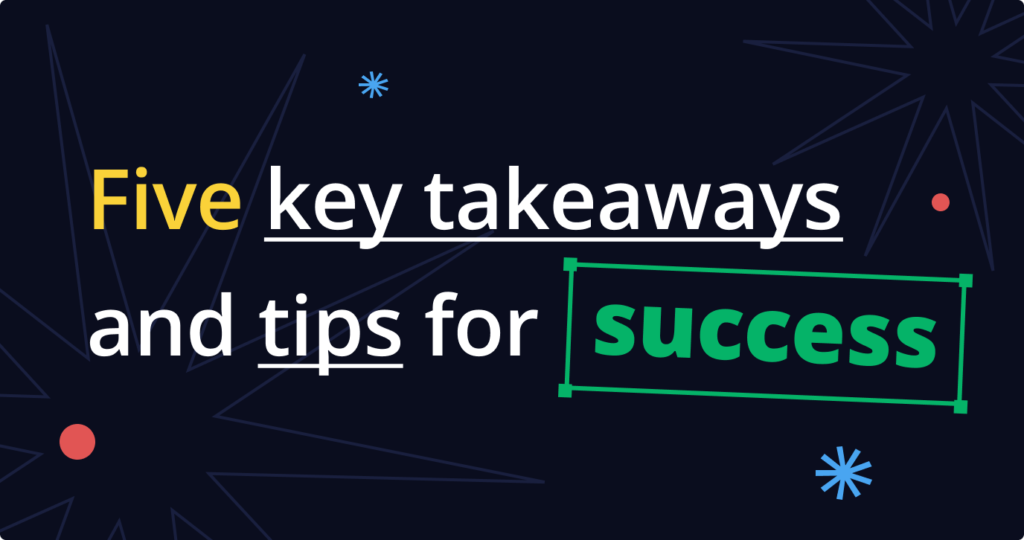
People like to ask me, “What does your job description look like?,” and “How do I know if it is the right fit for me?”
As I approach my first full year as an SDR, I have been thinking about the key takeaways I have learned while in the role. My initial responsibilities were basic; learn the product, book the meetings, know your number, meet it, beat it, and on to the next. This blog is 110% opinion and based–things I have learned along the way, plus some of the things I wish someone would have told me early on. This is not meant to be comprehensive or representative of all SDRs, just my experience. So if you want to step into the shoes of a first-year SDR, let’s go!
1. Understanding the importance of your role

Although it can be an entry-level position in Sales, SDRs play a key role in setting up the entire sales process for success. We are the first point of contact for a prospective customer, and our conversations impact the customers’ perception of the product and of the company overall. Understanding our role is vital to our success in the role!
2. Be clear in your expectations
Sales can be tough. Every day is dynamic; you never talk to the same person twice, rarely have the exact same conversation, and even then, it is rare that customers will have the exact same needs. One thing you can do to create some certainty is to emphasize your own goals. Of course, it’s easy to focus on daily, weekly, monthly goals when evaluating your own performance. But what about team goals?
Team goals and Individual goals are different. Both are vital for career growth, but they both offer a different outlook on how to attain these goals. Many sales teams work off quarterly and annual goals to provide a general scope of a team’s performance. Be sure to look at both in order to understand what is expected.
My Sales Enablement Manager, Katie Chatterton, loves to tell me, “Ali, your organization is your superpower,” and I have learned… it truly is! Knowing how to organize and manage your day makes reaching goals much easier. And I can’t stress it enough, when your expectations are clear, your goals can be too!
3. Stop trying to have all the answers
Because I pride myself on being articulate and knowledgeable with customer questions, my early days as an SDR were filled with frustration. I had to learn to openly say, “Hey, I’m actually not sure about that and don’t want to give you the wrong information. So let me note this as an action item and I will follow up with you.” My VP of Sales, Brian Lawrence, is exceptional about teaching our team to exhibit humble confidence.
Not knowing has become a mental trigger that I have something new to learn! Ask your team, leverage your colleagues, and utilize the resources around you. By doing so, you might be adding more to your team. When you provoke observation and ask a colleague to explain the answer, you are actually giving others a confidence boost by letting them show off their knowledge.
Trust yourself to know that you are likely your own harshest critic. Trust that you have done the back work to set yourself up for success, even if you fall short of a goal, or still have knowledge to gain.
4. Quality over Quantity

I am not saying numbers do not matter. What I am saying is that the quality of the opportunities you pass to AEs matters more than the volume of opportunities. If you take the time to truly dive into your prospective customer’s project, understand what they are looking to accomplish, listen to their current challenges vs. priorities, you are setting your Account Executive up for success.
Team Success is the best success. Again, I learned why I didn’t need to sacrifice the quality of my work for the sake of quantity because my role as an SDR is critical for the success of the team. And as I often hear from my Director of Sales, Amanda Collier, “garbage in, garbage out.” She found a simple expression to hit home the point that our entire team gets out of my work, what I put into it. I want the team to succeed, so I have learned to put in the extra effort to put forth quality opportunities for my AEs.
Again, as the entry point of the sales process, SDRs have more power than they realize. An SDR’s role is truly vital for setting the sales team up for success.
5. Notes matter, but how much is too much?
Prepping for your day is probably my biggest recommendation to anyone starting a new role as an SDR. Taking the time to research a prospect before your call, makes understanding their needs so. much. easier. Why? You get a deeper understanding of the company, the responsibilities of the prospect’s role, and what you might expect them to be looking for. It gives you time to look and see if there are other customers from a similar industry or similar role and prepare some quick points of how we added value to that sale. Doing a little bit of research really can go a long way.
The primary way to learn what a prospect is asking for is by simply listening to the things they say—asking questions to fully understand what they are looking to accomplish. Seek first to understand, then you will gather meaningful takeaways rather than meaningless facts. If you actively listen to something the prospect says and you reiterate what you heard, ask a follow-up question that piggybacks on what they said. This shows that you care, it shows that you are human, and that you are selling from your heart. Thank you for this pro tip, James Buckley!
Ever get off a call and realize there is a question you should have asked? Or maybe you recall a detail that you may have missed? This is another great time to connect with your AE, give them a heads up, add it and flag it in your notes. By doing this, you are actually setting up your AE for success the next time they connect with the prospect.
In conclusion, and for those of you who know my work ethic, this is my 110%! I hope you enjoyed my reflection on recommendations to be the best SDR you can be. Start with understanding your personal goals and team expectations. Be kind to yourself, and invest in being a team player aiming for top-quality leads to set your sales team up for success!
About the Author

Ali Panconi
Sales Development Representative at airSlate
[email protected]

